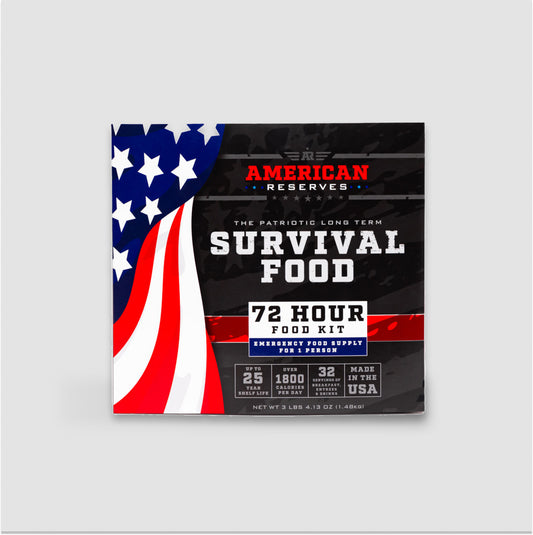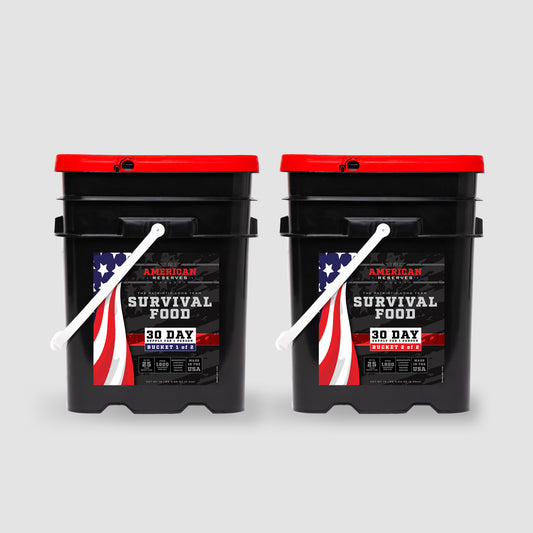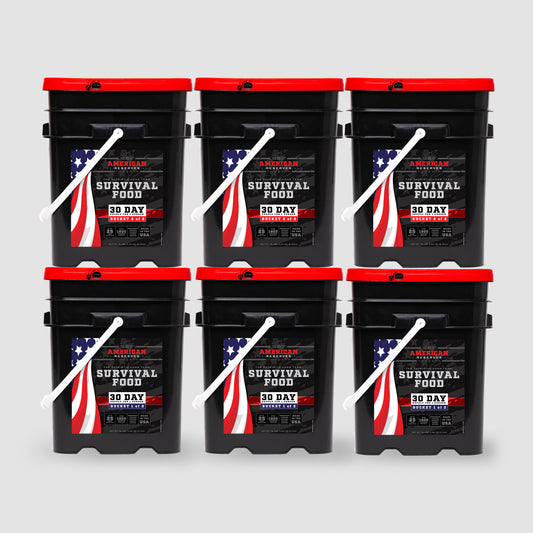
Long Shelf Life Foods: What Foods Have a Long Shelf Life?
Imagine a pantry stocked with foods that remain fresh and nutritious for years, offering peace of mind and convenience in times of need. Long-shelf life foods are the unsung heroes of food storage, providing a reliable source of sustenance for everyone from urban dwellers with limited space to remote communities living off-grid. In this article, we explore the diverse world of these durable foods, offering guidance on how to build a pantry that balances quality, nutrition, and longevity, ensuring you're always prepared for life's unexpected turns.
Why Is It Important To Know Which Foods Have a Long Shelf Life?
Understanding which foods have a long shelf life is crucial for several reasons, each resonating with diverse lifestyles and needs. For preppers and survival enthusiasts, it ensures readiness in emergencies, providing a reliable food source when fresh supplies are scarce. Budget-conscious shoppers benefit by reducing grocery trips and minimizing waste, while families and caretakers can maintain a steady supply of nutritious meals. Outdoor enthusiasts find value in lightweight, durable options for their adventures, and urban dwellers appreciate compact solutions amid limited storage space. For the elderly and those living remotely, long-shelf life foods offer convenience and security, while college students and travelers enjoy the ease of quick, non-perishable meals. Ultimately, knowing which foods last ensures that everyone, from individuals to large organizations, can efficiently manage resources, reduce waste, and maintain a balanced diet regardless of circumstances.
What Are The Benefits Of Having Long Shelf Life Foods?
- Emergency Preparedness: Long-shelf life foods are essential for ensuring that you and your loved ones have access to nutritious meals during emergencies or natural disasters when fresh food supplies may be disrupted.
- Cost Efficiency: By investing in foods that last, you can buy in bulk, reduce the frequency of grocery trips, and minimize food waste, ultimately saving money and optimizing your budget.
- Convenience and Versatility: These foods offer the convenience of ready-to-eat or easy-to-prepare meals, making them ideal for busy families, college students, and outdoor enthusiasts who need quick and reliable nourishment.
- Space Optimization: For urban dwellers and those with limited storage, long-shelf-life foods provide compact and efficient solutions, allowing you to maximize pantry space without compromising on variety or nutrition.
- Sustainability and Reduced Waste: By choosing foods with extended shelf lives, you contribute to a more sustainable lifestyle, reducing food waste and supporting eco-friendly practices that benefit the environment.
What Foods Have a Long Shelf Life?
Grains and Legumes
Grains and legumes are staples in any long-term food storage plan due to their impressive shelf life and nutritional value. Rice, particularly white rice, can last up to 30 years when stored properly in airtight containers. Similarly, dried beans, lentils, and chickpeas are excellent sources of protein and fiber, capable of lasting for decades. These foods are versatile, forming the base of countless meals, and are easy to store in bulk, making them a cornerstone of any well-prepared pantry.
Canned Goods
Canned goods are a classic choice for nonperishable, long-shelf-life foods, offering a wide range of options from vegetables and fruits to meats and soups. The canning process aids in the preservation of nutritional content and flavor, allowing these foods to last for years. Canned tomatoes, beans, and fish like tuna or salmon are particularly popular, providing essential nutrients and convenience. They require no refrigeration and can be consumed directly from the can or used in various recipes, making them indispensable in emergency food supplies.
Freeze-Dried and Dehydrated Foods
Freeze-dried and dehydrated foods are gaining popularity among preppers and outdoor enthusiasts due to their lightweight nature and extended shelf life. These foods retain most of their nutritional value and flavor, with options ranging from fruits and vegetables to complete meals. Freeze-dried fruits, for example, can last up to 25 years, offering a sweet and nutritious snack. Dehydrated vegetables and meals are easy to rehydrate and prepare, making them perfect for camping trips or emergency situations.
Honey and Maple Syrup
Natural sweeteners like honey and maple syrup boast an indefinite shelf life when stored properly. Honey, in particular, is known for its antibacterial properties and can remain edible for centuries. These sweeteners not only enhance the flavor of foods but also provide a natural energy boost. They are versatile ingredients that can be used in baking, cooking, or as a topping, ensuring that your pantry is stocked with both practical and delightful options.
Nuts and Nut Butter
Nuts and nut butter are nutrient-dense foods that offer a good balance of healthy fats, protein, and fiber. While nuts have a shorter shelf life compared to other long-lasting foods, they can still last up to two years when stored in a cool, dry place. Nut butter, such as peanut or almond butter, can last even longer if unopened. These foods are excellent for snacking, adding to meals, or providing a quick energy boost, making them a valuable addition to any long-term food storage plan.
Survival Food Kits
Survival food kits are specially curated packages designed to provide comprehensive nutrition and convenience during emergencies or outdoor adventures. These kits typically include a variety of freeze-dried or dehydrated meals, snacks, and beverages, all with extended shelf lives ranging from 5 to 25 years. Preppers, campers, and everyone else looking for a dependable, all-in-one solution for long-term food preservation will find survival food kits to be a great choice since they guarantee that you are well-prepared for any scenario with less effort.
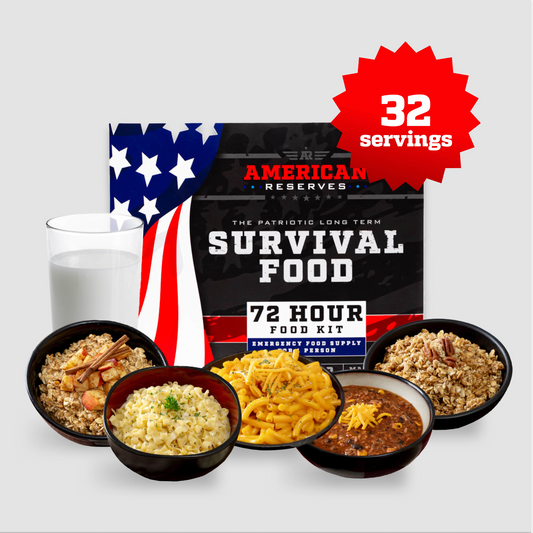
72 Hour Emergency Food and Drink Supply - 32 Servings
$36.99
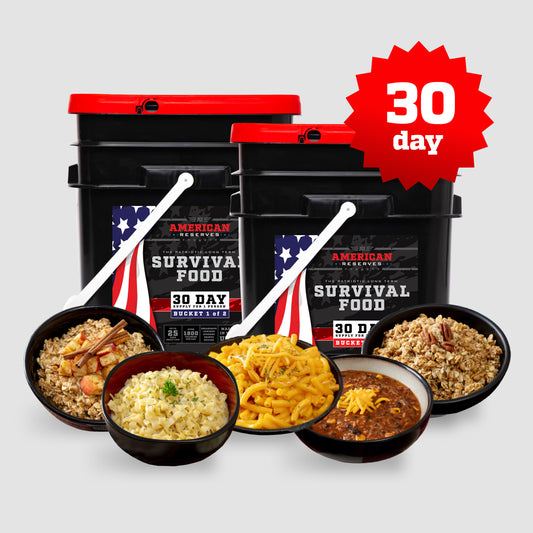
30 Day Emergency Food Supply
$319.99
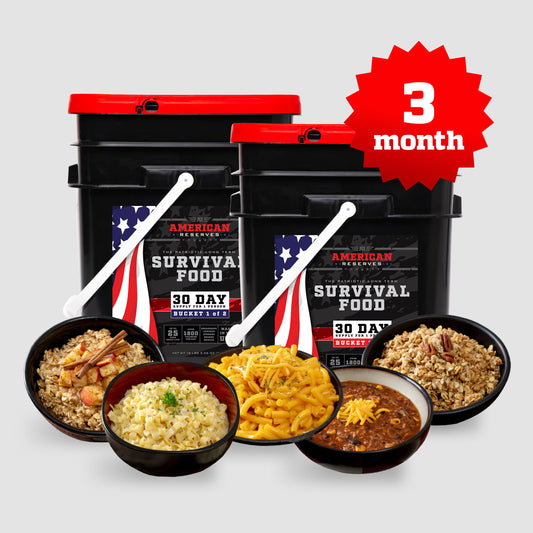
3 Month Emergency Food Supply
$835.00
Are Freeze-Dried and Dehydrated Foods Good Shelf-Stable Foods?
Absolutely, freeze-dried and dehydrated foods are exceptional choices for shelf-stable foods, offering both longevity and nutritional value. The processes of freeze-drying and dehydration remove moisture, which is the primary factor in food spoilage, thereby significantly extending the shelf life of these products—often up to 25 years or more. These are dependable sources of food as most of their natural nutrients and tastes are retained. Preppers, outdoor enthusiasts, and everyone else looking for quick meal options will find their lightweight nature and small packaging perfect for storage and transportation. Freeze-dried and dehydrated foods offer a flexible, nutritious, and long-lasting choice that guarantees you're always ready for whatever comes your way whether you're getting ready for an emergency or a hiking trip.
What Beverages or Drink Mixes Can You Store Long Term?
When it comes to long-term storage of beverages and drink mixes, several options stand out for their durability and convenience. Powdered drink mixes, such as instant coffee, tea, and hot chocolate, are excellent choices due to their extended shelf life and ease of preparation—requiring only water to enjoy. Additionally, powdered milk and electrolyte drink mixes provide essential nutrients and hydration, making them invaluable in emergencies or for those living off-grid. Bottled water, while not a mix, is a crucial staple for any long-term storage plan, ensuring access to safe drinking water when needed. These beverages and mixes are compact, lightweight, and versatile, offering both comfort and sustenance, whether you're preparing for emergencies, embarking on outdoor adventures, or simply seeking to reduce grocery trips.
Tips For Storing Long Shelf Life Foods
- Use Airtight Containers: Store your long-shelf-life foods in airtight containers to protect them from moisture, air, and pests. This helps preserve their freshness and nutritional value, ensuring they remain safe and edible for extended periods.
- Maintain a Cool, Dark Environment: Temperature and light can significantly impact the shelf life of foods. Keep your storage area cool and dark, ideally between 50-70°F, to prevent spoilage and degradation of nutrients.
- Rotate Your Stock: Practice the "first in, first out" method by regularly rotating your stock. This ensures that older items are used first, reducing the risk of spoilage and waste while keeping your inventory fresh.
- Label and Date Items: Clearly label and date all stored foods to keep track of their age and ensure timely usage. This simple practice helps you manage your pantry efficiently and avoid consuming expired products.
- Invest in Quality Storage Solutions: Consider using vacuum sealers, Mylar bags with oxygen absorbers, or food-grade buckets for optimal storage. These solutions provide an extra layer of protection against environmental factors, extending the shelf life of your foods even further.
Conclusion
In conclusion, investing in long-shelf-life foods is a strategic and empowering choice that caters to a wide array of needs, from emergency preparedness to sustainable living. By understanding which foods offer the best longevity and nutritional value, you can create a pantry that is resilient, versatile, and ready to support you through any situation. Whether you're a prepper, a budget-conscious shopper, or an outdoor enthusiast, these foods provide peace of mind and convenience, ensuring that you and your loved ones are well-nourished and prepared. By implementing effective storage practices and selecting the right products, you can maximize the benefits of long-shelf life foods, transforming your pantry into a reliable resource that stands the test of time.
Final Thoughts
Prepare to face any emergency with unwavering confidence by discovering superior survival solutions and premium USA-sourced ingredients from American Reserves. American Reserves emergency food supply kits offer vital nutrition precisely when you need it, making them an indispensable element of a robust emergency preparedness plan. Count on the esteemed quality of American Reserves to empower you to overcome any obstacle with assurance!
Sources
